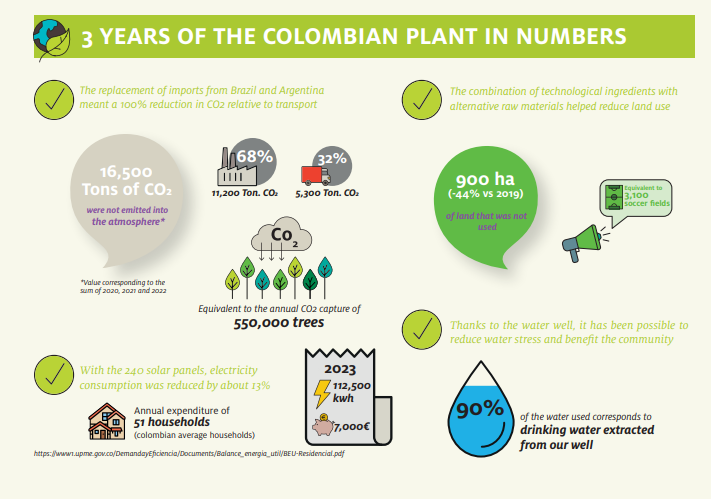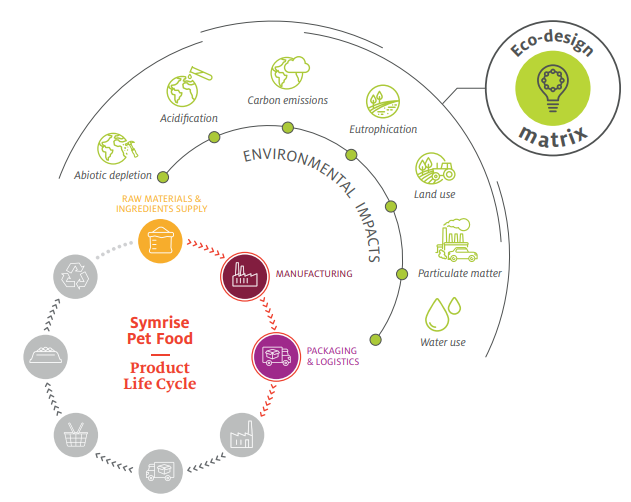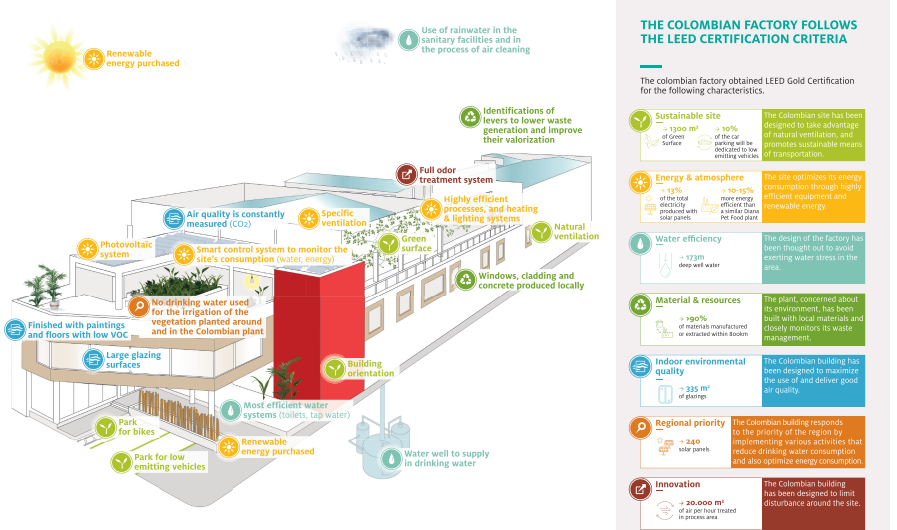The factory in Colombia was the first to apply these new standards, including LEED certification, one of the most prestigious certifications of sustainable building systems. Today, the company is proud to celebrate the 3rd anniversary of this plant model.

LEED Certification
The factory built in Colombia obtained LEED Gold certification at the beginning of 2022. The Leadership in Energy and Environmental Design (LEED) sustainable building certification system was developed by the U.S. Green Building Council (USGBC) and began implementation in 1993. It currently offers four types of certifications (Certified, Silver, Gold, and Platinum), according to 7 criteria: Sustainable Sites, Energy and Atmosphere, Water Efficiency, Materials and Resources, Indoor Environmental Quality, Regional Priority, and Innovation.
Christophe Salaün, General Manager of Symrise Pet Food Colombia, highlights the importance of Symrise Pet Food's choice to follow LEED standards:
"Not only is it one of the most widespread green certification systems in the world, it is also one of the most demanding, reflecting Symrise Pet Food's commitment to a sustainable industry that truly preserves the planet's resources."
Salaün adds: "Some examples of key actions implemented that meet LEED criteria include rainwater collection and use for sanitation facilities, high-level treatment for liquid disposal, optimization of site energy consumption through specific ventilation systems, heating and lighting, and the installation of photovoltaic systems."
Water and energy
Two of the main aspects that contribute to an eco-friendly industry are the efficient use of water and energy saving. In this sense, for the Colombia plant, a water well 173 meters deep was excavated that allows pumping groundwater through its own treatment plant, capable of reintroducing much of the necessary water into the circuit. "In this way, we can reduce the amount we take from municipal water supply plants to the point that today we are taking about 90% of the water needed for production from the well," explains Christophe Salaün. On the other hand, rainwater is collected and used for sanitary facilities and the air purification process. In addition, it is used for irrigation of vegetation planted around and inside the plant.
Marketplace
In terms of energy, the installation of 240 solar panels provides the facilities with 13% of the electricity needed. A natural ventilation system generates optimal climate control inside the building, while an intelligent control system monitors the site's water and energy consumption. Green areas on roofs and facades improve air quality, help reduce noise, and save energy.
Finally, as environmental compensation, 1,020 trees at least 1 meter high were planted. CO2 emissions were reduced by 33%.
Closer, greener
The Colombian plant serves the Andean region, supplying products to Ecuador, Peru, Colombia, and Venezuela. Before its construction, the region received products mainly from Argentina and Brazil. Following the company's motto 'The Closer, the Better,' which aims to be close not only to its customers but also to its suppliers, the Colombian plant saves gas emissions from transport: around 65% of sales are located less than 500 km or less than 8 hours by land transport, while about 52% of customers in the Andean region are in Colombia.
The local selection of ingredients also provides a significant reduction of ecological stress in the production of the product – 50% of the raw materials used are in Bogotá.
Eco-designed products
In addition to setting eco-friendly building standards, Symrise Pet Food developed a tool that measures the environmental impact of the product throughout its production chain. Called the Eco-design Matrix, it evaluates and supports Marketing and R&D teams in improving the environmental impacts of products throughout their life cycle, from supply to delivery to the customer.
This tool allows Symrise Pet Food to know the footprint data in each of the four main steps of the product life in which it has influence – sourcing, manufacturing, packaging, and logistics– and from seven environmental impacts: carbon emissions, land use, water use, acidification, abiotic depletion, eutrophication, and particulate matter.

"With the Eco-design Matrix, we found a new driver of innovation," explains Anderson Conejo, LATAM Marketing Manager. "We can now select ingredients and design new products taking into account not only functionality and economic performance, but also environmental impacts over the life cycle."
With this tool, Symrise Pet Food is now able to support customers who want to promote the sustainable development of their products.
Joint effort
After it was confirmed that July 2023 was the warmest month on record, the Secretary General of the United Nations, António Guterres, warned: "The era of global warming is over, and the era of global boiling has arrived." A concerted effort is now essential to combat climate change and achieve truly sustainable development. That is why Symrise Pet Food proposes to make this trip together with all the actors involved in the pet food industry. The challenge is not minor: the growing demand depends on a limited availability of raw materials. On the other hand, regulatory and sanitary restrictions on the production and export of products are another challenge that must be faced.
Finally, pet parents today demand natural, ethical, and transparent products. Symrise Pet Food proposes to consider these difficulties as an opportunity for collaboration that not only results in a product of excellence, but that contributes to caring for people, pets, and the planet. Its goal is to work together to bring to market solutions that provide sustainable sourcing, are secure, and generate long-term value.
The efforts poured into the Colombian plant have not gone unnoticed: it has recently been nominated for the awards for "Business Environmental Excellence" of the Ministry of Environment of the Municipality of Tocancipá. The local environmental authority reviewed the environmental data (carbon footprint, water, energy, gas, waste management, treatment plants, boiler) and made a tour of the plant. "We were informed that we are going to be nominated for the award for corporate environmental excellence," said Christophe Salaün. This nomination was made by the local environmental authority in November, after visiting all the companies operating in Tocancipá. 'The election will be in early 2024. We hope to have good news', added Salaün.
From this first model experience for the entire Symrise group, Symrise Pet Food is building its new plants (the most recent in Mexico and Brazil) following LEED standards, with the intention of contributing positively to a better world for future generations.

Symrise Pet Food is a global leader in sustainable high-value solutions that improve pets' well-being and owners' satisfaction. The company offers multiple products and services that improve palatability, pet nutrition, and pet food protection. Symrise Pet Food is present on 5 continents with 1,750 employees, 32 sites, and 4 expert measurement centers with 1,100 dogs and cats.
Source: All Pet Food Magazine
You could be interested: JBT Marel to Host Pet Food Open Day & Seminar in Belgium
About company

About company
Symrise Pet Food, part of the Taste, Nutrition & Health segment of Symrise, is the global leader of sustainable high value solutions improving pets’ well-being and owners’ satisfaction. The division provides multiple products and services improving pet food palatability, pet nutrition and pet food protection. Symrise Pet Food is present on five continents with 1,750 employees, 32 industrial sites, and four expert measurement centers with 1,100 cats and dogs.
Symrise Pet Food aims to bring all pets a better life by being at the heart of every eating experience by 2030.
Noticias de la empresa
07/03/2025
























































